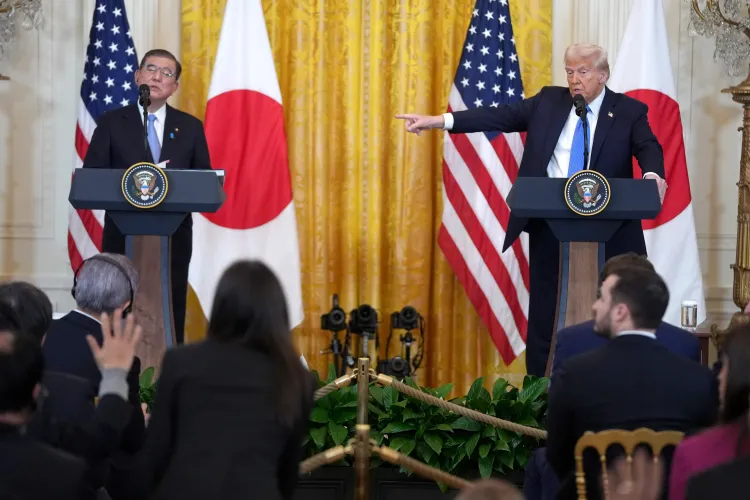Japanese PM Discusses Tariffs with US President Trump

Synopsis
Key Takeaways
- Shigeru Ishiba spoke with Donald Trump regarding new tariffs.
- Japan faces a 24 percent tariff, significantly impacting its economy.
- Both leaders agreed to further discussions by their ministers.
- Tokyo stocks plummeted following fears of a trade war.
- Ishiba plans to visit the US at an appropriate time.
Tokyo, April 7 (NationPress) The Prime Minister of Japan, Shigeru Ishiba, engaged in a telephone conversation with US President Donald Trump on Monday evening to address the newly imposed US tariffs, as reported by local media.
Ishiba conveyed to Trump the importance of pursuing cooperation that would yield benefits for both countries, expressing his apprehension that the US tariffs might undermine the investment capabilities of Japanese enterprises, according to Kyodo News.
This call marked the first communication between the two leaders since Trump introduced fresh tariffs the previous Wednesday, which included a baseline tariff of 10 percent on imports from all trading partners, alongside higher rates for specific countries.
With Japan facing a 24 percent tariff, it stands as one of the nations most severely impacted by these measures, prompting Tokyo to advocate for an exemption.
After their discussion, Ishiba informed reporters that both he and Trump concurred on the need for their ministers to further deliberate on the matter, as reported by Xinhua news agency.
Ishiba also mentioned his intention to visit the United States at a suitable time.
Japanese officials have persistently urged the US to grant an exemption from these tariff policies, emphasizing Japan's role as the largest foreign direct investor in the US for five consecutive years up to 2023.
On the same day, Tokyo's stock market experienced a significant decline, with the benchmark Nikkei index witnessing its third-largest point drop in history, amid a worldwide market downturn fueled by escalating fears of a potential trade war and a global economic recession due to the increased US tariffs.
The Nikkei stock index, known as the 225-issue Nikkei Stock Average, closed down by 2,644.00 points, or 7.83 percent, from the previous Friday, finishing at 31,136.58, its lowest close since October 31, 2023.
Meanwhile, the broader Topix index ended down 193.40 points, or 7.79 percent, at 2,288.66.
Panic selling swept through the stock market following declines on Wall Street the previous Friday, as sweeping US “reciprocal tariffs” sparked fears of a trade war and an impending global economic downturn.
The Nikkei's decline represented the most substantial drop since the 3,836-point fall recorded on October 20, 1987, following the infamous Black Monday stock market crash.
At one point, the benchmark index plummeted by nearly 3,000 points, dipping below the critical 31,000 threshold, with major technology stocks coming under pressure after Trump indicated last week that he plans to announce tariffs on semiconductor and pharmaceutical imports soon, as noted by analysts.










